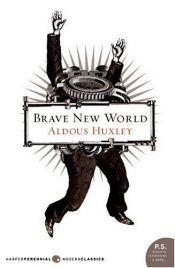Konec civilizace
Blurb
Konec civilizace: aneb Překrásný nový svět, v prvním překladu Konec civilisace, v originálu Brave New World, je antiutopický sci-fi román anglického autora Aldouse Huxleyho. Autor román sepsal roku 1931 a vydal v roce 1932. V češtině vyšel o rok později pod názvem Konec civilisace, ale většího zájmu se dočkal až pozdější překlad od překladatelské dvojice Josef Kostohryz a Stanislav Berounský v roce 1970.Děj románu se odehrává v Londýně v roce 2540, kde se objevují motivy pokroku v reprodukční medicíně, učení ve spánku a jejich dopad na společnost. Autor popisuje společnost, která uměle zvyšuje svoji spokojenost za cenu ztráty citů a emocí. Tuto společnost následně konfrontuje s člověkem, který tímto vývojem neprošel.
Myšlenky z knihy autor později doplnil a rozvinul v eseji Brave New World Revisited a ve svém posledním románu Ostrov.

 English
English Español
Español Deutsch
Deutsch






![Muž z vysokého zámku [The man in the high castle]](/images/cover/.tmb/thumb_0965018849-L_60_100.jpg)



Member Reviews Write your own review
Aleksandra.marinkovic
Just keep in mind throughout the book that it was written in 1931. You will be devastated every time you remember that.
Be the first person to review
Sofiia
first of all, i am very happy that i purchased an edition with a beautiful introduction of yuval noah harari. „the climatic dialogue between mustapha mond and john the savage is among the most profound discussions of technology, happiness and the meaning of life in modern western philosophy.“ i followed his advice and as i reached this dialogue, in other words the culmination, i could clearly see how society destroyed a moral in order to reach an eternal comfort. we are striving for a society which would have no trouble in living, no choice and no problems, but if no bad side exists will we continue to stay human? because we are the creatures, for whom it’s natural to make mistakes, to fight for something. and as we see in this book, pressing a natural „bad“ side of human turns them into a vegetable (nice phrase which use to describe people during totalitarian regime in ukraine) and completely erases a personality. „you got rid of them. yes, that’s just like you. getting rid of everything unpleasant instead of learning to put up with it, whether ’tis nobler in the mind to suffer the slings and arrows of outrageous fortune, or to take arms against a sea of troubles and by opposing end them… but you don’t do either. neither suffer nor oppose. you just abolish the slings and arrows. it’s too easy.“ and further consequences, which we can see is a disappearance of all forms of art because what? right, because the point of art is highlighting problems in society and a person in an aesthetically pleasing way. and as an example there was a shakespeare and a bible, which was considered to be „a pornographic literature“. but of course we need no problems. but still we will continue „to advance“ to a flawless society, a brave new world. at this point, we will have to try also to save a morality, cherish culture and literature and don’t reject our natural human side.
Be the first person to review
Xie.zhavia
Hi watch this! https://www.youtube.com/watch?v=ljOSF_byl80&t=0s
Be the first person to review
Nick.embrey
Good despite itself, as the only really sympathetic character is Lenina. The whole cast of protagonists make their case even more ridiculous than it would already be.
Be the first person to review
Cirrusstratus
Düster und in einigen Punkten erschreckend genau auf den Punkt. Leider hat es in vielen Abschnitten echte Längen. Regt aber dennoch auch zum nachdenken an.
Be the first person to review
Thiago1979
ótimo livro
Be the first person to review
Klauda
Misfritz.com informiert Was gefällt, ist das Kolorit, wie er Zeitgenössisches abfackelt. Dann wiederum nervt er, schreibt einfach aus der Wikipedia ab, langweilt mit pseudo-wissenschaftlicher Sprache. Problem: Er kann nicht wirklich schreiben.
Be the first person to review